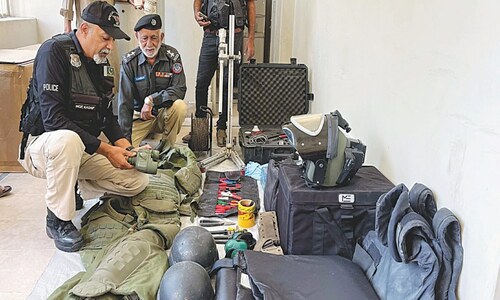KARACHI: The first session on the third day of the 7th International Urdu Conference on Urdu poetry had a little interesting twist in the end when Iftikhar Arif hinted at the fact that at the global level the 20th century was known more so for its fiction writers than poets.
Dr Tanvir Anjum was the first speaker of the day who shed light on the evolution of the prose poem. She said it had gone past the phase where it was met with tough resistance from different quarters. She took many a name representing different periods of the genre’s evolution — from Anis Nagi to Qamar Jamil and from Azra Abbas to Sara Shagufta — and added that there’s a possibility that it would emerge as the leading form of poetry in the 21st century.
Azra Abbas reminisced about the time when she learned many aspects of the art of poetry at Qamar Jamil’s place and the time when she faced criticism.
Dr Ziaul Hasan read out a paper on contemporary ghazal. He said ghazal knew the nature and disposition of the region where it was born. It passed through quite a few stages which meant it could entail any subject. Then in the last 50 years poets experimented with its form and content, some of which were well received. Still, the main issue confronted by the ghazal writer was of the creative use of diction.
Jazib Qureshi’s paper was on the evolution of nazm in which he mentioned poets such as Miraji, Aziz Madani and Majeed Amjad. He reckoned at present not many writers were making their presence felt.
Obaid Siddiqui argued that it’s impossible not to discuss ghazals written in the 21st century without reflecting upon its preceding age. The 20th century was the most significant one in our literary history not only with regard to poetry but with reference to fiction and criticism as well. The amount of quality poets produced in the 20th century was the most in the 300-year journey of Urdu poetry. He gave examples of a number of poets, beginning from Iqbal, whose nazms and ghazals in his view had no qualitative difference. He quoted a couple of ghazals to show how Iqbal had evolved and added that he disagreed with some of the poet’s ideas (commenting that one of his ghazals could become a Taliban anthem) but respected him as a great versifier.
Mr Siddiqui followed it up with examples of Yagana, Faiz and Jigar after which he took the names of Majrooh Sultanpuri and Makhdoom Mohyeddin saying they were very good progressive poets eclipsed by Faiz’s fame. He dedicated the latter half of the 20th century to Nasir Kazmi because he freed ghazal from Persian’s influence. Mr Siddiqui recited many ghazals, including Yagana’s.Dr Najib Jamal spoke on the aesthetics of Urdu poetry.
Poet Iftikhar Arif came to the podium and said there was a time when poets ruled the literary world but in the 20th century fiction writers such as James Joyce started to stand shoulder to shoulder with poets, so much so that there came a time when poetry was pushed in the background. Now, on the global scale this century was dominated by the novel. As for what kind of poetry was being produced in Pakistan, he said it’s for each one of us to study and examine. Of all the literary genres, poetry was the most challenging for a creative person, he added.
Rasa Chughtai presided over the session.
The second session on Urdu and its relations with other regional languages was beautifully summed up by writer Amar Jaleel. He said Urdu was the most romantic language. If he were to be romantic with a girl, he’d do so in Urdu. He labelled the language a ‘miracle’ and explained that if a Pathan were to strike up a conversation with a Sindhi, he’d not do so in Pushto but in Urdu.
Mr Jaleel said it was the All India Muslim League which hurt the Urdu language by using it as a weapon. “Languages have no religion. Can we call English the language of Christians?” he said. Language was a medium to communicate, he stressed.
Another important session presided over by Farhad Zaidi was on ‘Urdu and the Media’.
Harris Khalique said while the media had played a positive role in promoting the language, Urdu had failed to be the language of intellectual discourse.
Masood Ashar said the media had played a significant part in distorting Urdu and we couldn’t ignore that.
Agha Nasir said newspapers, radio and television had one target audience. Television channels hired people from the print media as anchors but not all of them were broadcasters.
Obaid Siddiqui said it was difficult to define what constituted simple language (asaan zabaan). He mentioned that the language used in newspapers was different from the one used by the electronic media because newspapers were read by the educated segment of society.
Asghar Nadeem Syed said it was in Urdu’s nature to accept change.
Raza Ali Abidi said apart from other things a media person needed to educate himself/herself on different aspects of language. He resented the fact that now there were too many TV channels and newspapers.
Some of the other sessions marked for the day were on the influence of the Progressive Movement on Urdu and the launch of books Mir Baqar Ali — Dastango, Ronaq-i-Bazm-i-Jahan, Dard Ki Qindeel and Yagana.
Published in Dawn, October 19th, 2014














































